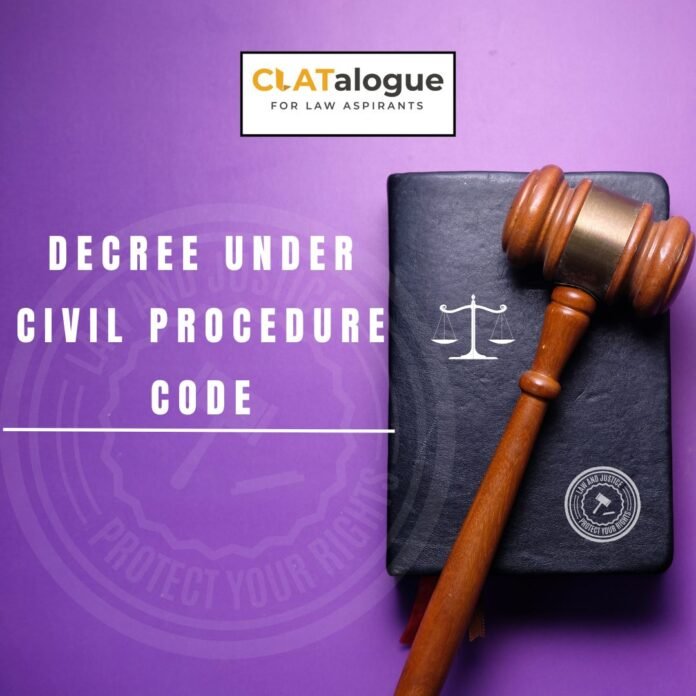[ad_1]
This article delves into the meaning, provisions, types, and essentials of a decree under the Civil Procedure Code, 1908 (CPC).
What is a Decree?
The term “decree” is defined under Section 2(2) of the Civil Procedure Code, 1908. It states:
“Decree means the formal expression of an adjudication which, so far as regards the court expressing it, conclusively determines the rights of the parties with regard to all or any of the matters in controversy in the suit and may be either preliminary or final.”
In simpler terms, a decree is the court’s decision on the rights of the parties involved in a civil dispute. It is a formal, written declaration that resolves the issues presented in a case.
Key Elements of a Decree
- There must be a judicial determination of the dispute.
- The decree determines the rights and liabilities of the parties.
- The decision must settle the issues finally, leaving no ambiguity.
- The court’s decision must be recorded in a formal manner.
- A decree can only arise out of a suit filed in a civil court.
Types of Decrees
The CPC recognizes three main types of decrees:
- Preliminary Decree (Section 2(2)): A preliminary decree is one that decides the rights of the parties involved in a suit but does not completely dispose of the suit. It lays down the groundwork for further proceedings and serves as a preparatory stage for the final resolution.Example: In a partition suit, the court may determine the shares of parties first (preliminary decree) and later divide the property (final decree). A preliminary decree may declare the rights of creditors and beneficiaries before directing the final settlement of accounts.
- Final Decree (Section 2(2)): A final decree conclusively resolves all matters in controversy between the parties and disposes of the suit entirely. It is the last step in the judicial process and provides enforceable relief to the successful party.It disposes of the entire suit without leaving any issues unresolved. It is executable and enforceable by the decree holder. It may follow a preliminary decree or directly resolve all issues without a preceding preliminary decree.
Example: The court’s final division of property based on the shares determined in the preliminary decree in a partition suit.
- Partly Preliminary and Partly Final Decree:A partly preliminary and partly final decree is a hybrid decree where part of the suit is conclusively decided (final), while other issues are left open for further adjudication (preliminary). The purpose of this type of decree is to address complex cases where certain aspects can be finalized while others require additional proceedings.It contains elements of both preliminary and final decrees. It is passed in suits involving multiple issues or claims. It allows partial execution of the decree while leaving other matters for determination.
In mortgage suits, the court may decree the amount due as preliminary and order the sale of the property as final.
Essentials of a Decree
To qualify as a decree under the CPC, certain conditions must be met:
- A decree can only be passed in a suit instituted by presenting a plaint.
- The court must make a formal decision on the matters in controversy.
- The decision must determine the legal rights of the parties conclusively.
- The decree must be pronounced by a court of competent jurisdiction.
- Interim or interlocutory orders, which are temporary in nature, do not constitute decrees.
Decree vs. Judgment vs. Order
To understand decrees better, it is essential to differentiate them from judgments and orders:
- Judgment:
- A judgment is the statement of reasons given by the court for arriving at a decision.
- It precedes the decree and forms its basis (Section 2(9) of CPC).
- Order:
- An order is the formal expression of a court’s decision on matters other than those which result in a decree (Section 2(14) of CPC).
- Unlike a decree, an order does not conclusively determine the rights of the parties.
Decree Holder and Judgment Debtor
- Decree Holder: The person in whose favor the decree is passed.
- Judgment Debtor: The person against whom the decree is passed.
The CPC also provides mechanisms for executing a decree, ensuring that the decree holder receives the relief granted by the court.
Conclusion
The term “decree” holds immense significance as it represents the final adjudication of a dispute by a civil court. Whether preliminary or final, the decree’s role in the judicial process underscores the importance of procedural law in achieving substantive justice.
[ad_2]
Source link

